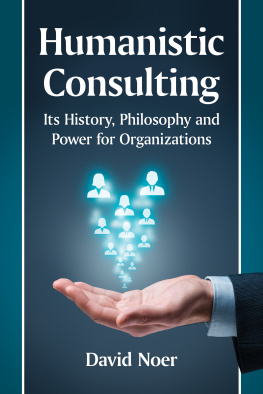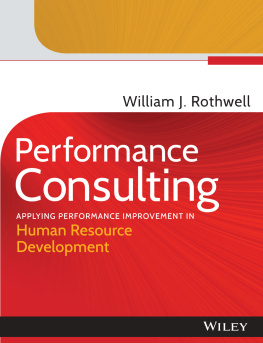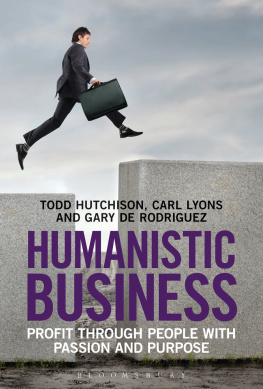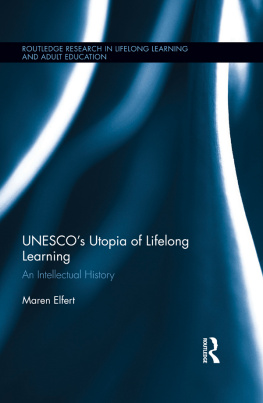
Also by DAVID NOER
Keeping Your Career on Track: Avoiding Derailment, Enriching the Work Experience and Helping Your Organization (McFarland, 2016)
Humanistic Consulting
Its History, Philosophy and Power for Organizations
DAVID NOER

McFarland & Company, Inc., Publishers
Jefferson, North Carolina
LIBRARY OF CONGRESS CATALOGUING DATA ARE AVAILABLE
BRITISH LIBRARY CATALOGUING DATA ARE AVAILABLE
e-ISBN: 978-1-4766-2747-2
2017 David Noer. All rights reserved
No part of this book may be reproduced or transmitted in any form or by any means, electronic or mechanical, including photocopying or recording, or by any information storage and retrieval system, without permission in writing from the publisher.
Front cover image 2017 iStock
McFarland & Company, Inc., Publishers
Box 611, Jefferson, North Carolina 28640
www.mcfarlandpub.com
List of Figures
Preface
I recently interviewed a candidate to help conduct a leadership development workshop. I use a humanistic approach, I began.
After a pause and a quizzical look she said, I like to work with people, too.
Thats nice because the participants in our workshop are all people, no dogs or robots allowed, I responded, attempting to inject a little humor. Tell me about your humanistic values and contrast them with those of a traditional management consultant.
She replied by telling me about her experience in team-building and familiarity with diagnostic tools such as the Myers-Briggs type indicator, the FIRO-B, and certification on a popular 360-degree feedback instrument.
What did you learn about yourself when you last experienced a T-group and do you think NTL is losing its influence?
Shed never gone through one of those useless, embarrassing, sensitivity training sessions, and didnt think they were worth the effort. She admitted shed never heard of the National Training Labs.
This candidate had a masters degree in organization development, a field grounded and differentiated by humanistic values. She was bright, motivated, and excited about working in leadership development. Unfortunately she was reflective of too many humanistic practitionersclueless as to the history and evolution of her field, and focused on tools and techniques at the expense of the primary tools: her own compassion, empathy, and authenticity.
A few months later, a senior executive in a large corporation, was seeking to retain a coach to fix one of his employees who was not a team player, had problems with authority but was loved by his own employees and customers.
After the normal ice-breaking small talk, I finally asked the essential questions, To what degree do you think you are part of the problem? Are you willing to examine your own behavior? Can I count on you to meet with this employee and me to make the relationship more productive?
No, no, youve got it wrong. I want to hire a coach for himgive him feedback on what changes he needs to make.
Does he think he needs a coach?
No, but I do, and you have to let him know why.
So, youd be the client, not him. Have I got that right?
From there, the session went downhill rapidly. I left, knowing that this executive needed to retain a coach not grounded in values of openness, free will, and collaboration, and dubious that such a coach would achieve much. I was also quite sure that the executive would be telling his HR vice president not to send him any more of those touchy-feely, ex-hippie kooks masquerading as executive coaches.
The Purpose of This Book
These two experiences, along with many others in my professional life, clarified the vital need for both practitioner and client to better understand the history, focus, and value base of humanistic consultation. Far too many practitioners have little understanding of the roots and evolution of the core values of their field. Far too many operating managers lose the powerful value of humanistic consultation by seeking simple, external, prescriptive solutions to complex problems involving human relationships.
The humanistic approach to working with individuals and organizations spans leadership development, executive coaching, organization development practice, organizational behavior teaching, and efforts to transform and revitalize entire organizational systems. Its tools and techniques are borrowed from clinical psychology, counseling, therapeutic approaches, and business change strategies. In the final analysis, the most relevant humanistic tool is the practitioners own warm bodyher compassion, empathy, core values, and authenticity. The historical roots of humanistic consulting practice, its cross-functional applications, and its powerful potential have, for too long, gone unexamined. Their articulation is the purpose of this book.
Audiences
Humanistic practitioners. This book will be helpful to both internal and external humanistic consultants regardless of the focus of their practice. It traces the historical roots and overlapping disciplines of their profession. It will clarify the sources of their interventions and provide a holistic perspective that will enable them to better serve their clients and affirm the core values of their calling.
Managers seeking consultants. For managers seeking consulting assistance, understanding the differences between the roles of traditional management consultants and those of the humanistic variety will eliminate confusion and surprises. Awareness of the values and approaches of humanistic consultants will greatly facilitate consultant choice, depth of intervention, and client involvement.
Managers wanting to operate in a humanistic manner. Operational managers attempting to move from a controlling, evaluating, prescribing, role to an individual or group helping relationship will gain a deeper understanding of the skill and value orientation of the new approach. They will realize the wisdom of partnering with an experienced humanistic consultant to guide them through the transition.
Those in leadership development roles. Regardless of functional orientation, those seeking to develop organizational leaders with the interpersonal competence and intra-personal insight to build sustainable, productive, socially responsible organizations will find this book of great benefit. Humanistic approaches to leadership development are central to nurturing leaders with the abilities to be relevant to todays complex, multicultural, global organizations. Traditional training and development methodologies will only result in traditional, marginally effective leaders.
Students, researchers, and organizational historians. The book provides fresh insights into the historical roots and interconnectedness of the humanistic consulting model. Without understanding the evolution, scope, and potential of humanistic consulting, students, teachers, and researchers will be operating without an anchor to the past or a compass to the future.
Overview of the Contents
Part One: History, Evolution and Applicationsthe chapters in this section trace the history, interconnectedness, and application areas of humanistic consulting practice:
Chapter 1, The Humanistic Consultant, covers the definition of the field, its relationship to traditional management consulting, and characteristics of practitioners.
Next page










